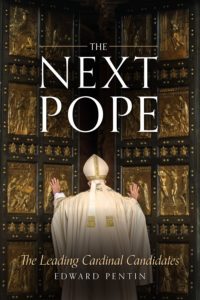As a musician in my parish church, I am required to step into the sacristy every Sunday before Mass to take my temperature, register it on a form, and certify that I have no symptoms of the coronavirus before climbing up to the choir loft. The day the procedure was initiated several weeks ago, the organist was protesting the new policy to the priest as I entered the room. The requirement, she claimed, was “dictatorial.” I ought to have reminded her that the order came down from the bishop in Cheyenne, not the Governor of Wyoming, and that the Church of Rome (unlike the Cowboy State) is not a democracy. The parishes around the state do not elect their bishop, just as the Catholic faithful around the world do not elect their pope. It is with this fact in mind that I view the current interest in “the next pope,” the subject of a new book by Edward Pentin released this summer.
There is no reasonable objection that I can see to speculation by members of either the clergy or the laity on the occasion of the next papal election and its result. Although some Catholic critics find it impious, I am not among them. Their objections, so it seems to me, have been convincingly dismissed by John L. Allen, Jr., in “Three bogus objections to thinking about the next pope” (Crux, June 28, 2020).
The first of these, as listed by Mr. Allen, is that guessing at the identity of a successor while the current pope remains among the living is “disrespectful and disloyal” (I should add “callous” and “insensitive”), amounting possibly to a political attack on his papacy. This objection Allen dismisses by reminding us that the direction of the Catholic Church depends upon the selection of a new pope, and that “the last thing you want is for the cardinals who will make that choice—and the lone certainty here is that one day, they will have to make it—to be poorly informed about their alternatives.”
Orthodox. Faithful. Free.
Sign up to get Crisis articles delivered to your inbox daily
The second is that the final decision by a conclave has been historically uncertain, a truth encapsulated in the hoary Italian motto “he who enters a conclave as a pope exits as a cardinal.” Allen’s response is to note that in the last six papal elections the clearly favored candidate won twice, and someone from the “B list” won twice as well. “Only in two cases did real dark horses prevail, with John XXIII and John Paul II.”
Finally, some pious Catholics argue that discussing a conclave in secular political terms exposes “a deficit of faith,” as the Church attributes the selection of a pope to the action of the Holy Spirit. “In truth,” Allen says,
it’s the failure to factor in those human elements that betokens a lack of faith, or at least an understanding of the faith, because we’re Catholics, not Docetists. The Catholic understanding, as famously articulated by Aquinas, is Gratia non tollit naturam, sed perficit, meaning “Grace does not eliminate nature but perfects it.” This last objection comes closest to the mark. Still, there is something more to be said, I think.
Since the beginning of the last century, owing to better and more widespread systems of communication and means of travel, the papacy has become far less remote to Catholics everywhere, and correspondingly more present to them. While this has been in many ways a healthy development in the life of the Church, it has had unwelcome results as well. The first is the popular celebration of the papacy—the transformation of the pope from a figure revered at a distance into a celebrity of the modern type.
The second, which follows directly from the first, is to politicize both him and the institution he represents. A contemporary Pope is not only the head of a church—the Church—he is as much a public head of state as a monarch, a prime minister, or a president. (At least, he is regarded by the world as one, and treated as such.)
This, emphatically, is not a healthy development; rather it is something to be discouraged. One way to do so is drastically to reduce the scope and frequency of papal travel and papal appearances domestically and internationally. Another, perhaps, is to limit his visible presence at the Vatican and his communications with the public, including the Catholic public.
The way not to do it is to treat papal elections like presidential ones, so that conclaves become the ecclesiastical equivalent of American political conventions, or British party conferences.
For one thing, the Church possesses an infinitely greater importance and dignity than any nation does. For another, to return to where we started, it is not run on democratic principles, but on strictly hierarchical ones. Should the faithful be led to imagine otherwise by loud publicity campaigns launched by ecclesiastical and popular factions in anticipation of the next papal conclave—including political favorites, favored sons and dark horses, and publicity polls and the like—the results would not simply be disastrous; they would be catastrophic.
Once the appearance of democratic government attaches to the Church, the reality of it—or an attempt at it—would inexorably ensue. The Chair of Saint Peter is not the Oval Office, and the papal apartments are not Number 10 Downing Street, nor should they be conflated. The Holy Spirit would never allow such a thing, of course, but why put Him to the trouble of having to avert it?

Edward Pentin’s book The Next Pope
is available now from Sophia Institute Press.
Photo credit: Vatican Media/CNA